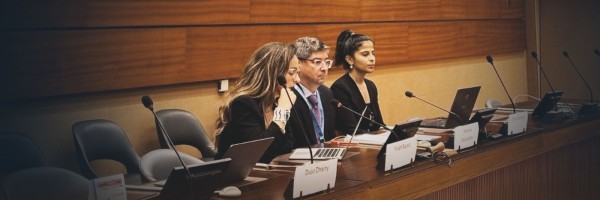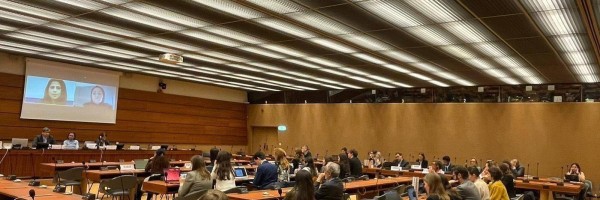On 11 August 2023, ALQST's Head of Monitoring and Advocacy Lina AlHathloul spoke in an online briefing convened by Congressman Jim McGovern about women's rights in the Middle East and Afghanistan. The hearing was scheduled to take place with the Tom Lantos Human Rights Commission, but was vetoed.
Read AlHathloul’s opening remarks below about the lack of genuine reforms on women’s rights in Saudi Arabia.
Since the launch of Saudi Arabia’s Vision 2030, women’s rights have been at the centre of the discourse around reforms. The Vision describes women as “another great asset,” and states that it aims to empower women.
Although the Saudi authorities have lifted some of the restrictions women face under the country’s male guardianship system, including allowing women to apply for their own passports, as well as relaxing strict gender segregation in public spaces and allowing women to drive - the male guardianship system – a legal framework that treats adult women as minors – continues to negatively affect all aspects of women’s lives and severely restrict their fundamental liberties.
Reforms have been announced supposedly to protect women from abuse, but they lack adequate means of enforcement, leaving many women trapped in abusive relationships. ‘Disobedience’ by a woman towards her male guardian (father, husband, brother or even son) also remains a crime, effectively rendering her new freedoms null and void if her male guardian objects.
Such a complaint by a male guardian can lead to a woman being detained in Dar al-Re‘aya literally translated as care homes . The reasons for which girls and young women are referred to Dar al-Re‘aya include taghayub (being absent, ‘absconding’ or running away from home), engaging in an act of moral indecency such as extramarital sexual relations, committing murder, or ‘uquq (disobeying a male guardian).
The case of Shaimaa al-Bugmi is very telling. Shaimaa had been a victim of domestic violence, including threats by her father to kill her, and as there are no shelters to protect women victims of domestic abuse, she had left her house to live independently. Her father later reported that she had run away from home. Shaimaa was arrested and has been missing since.
Moreover, given that women are now allowed to apply for their own passports, we have seen that this led to an exponential increase in the number of women fleeing the country, either for domestic reasons or political ones.
One recent example that has gained international attention is that of Foz al-Oteibi, one of Saudi Arabia’s most famous influencers. Foz and her sister Manahel were summoned and charged for not wearing an abaya, and for tweeting on feminist hashtags. Foz fled the country before her arrest, and her sister Manahel has been arrested and is being tried before the Specialised Criminal Court, the court dealing with terrorism cases.
More than being applied inconsistently, these changes are taking place in a context in which the space for free speech is virtually non-existent, barring public debate on key legal reforms, and harshly sanctioning anyone who dares speak about their situation or opinion. In fact, there is a significant discrepancy between the reform narrative Saudi Arabia is advertising to the international community and its treatment of civil reform movements internally, on which it continues to harshly crack down: women who peacefully call for their basic rights continue to be targeted and punished. In recent months the Saudi courts have convicted and passed long jail sentences on several women over peaceful rights activity on social media, including Salma al-Shehab (27 years), Fatima al-Shawarbi (30 years), Sukaynah al-Aithan (40 years), and Nourah al-Qahtani (45 years). This comes amid an intensified crackdown on social media activity in general, with the authorities brazenly jailing individuals for peaceful tweets, signalling that nobody is safe.
Prominent women human rights defenders including Nassima al-Sadah, Samar Badawi and Loujain al-Hathloul, who have long advocated for women’s rights, and who were charged and sentenced by the terrorism court for their feminist activism, continue to face heavy restrictions since being released from prison, notably travel bans that prevent them from leaving the country. Moreover, the brutal torture they have endured by state officials has never been investigated.
Finally, as analysed by HRW and Amnesty International, the much awaited Personal Status Law that was published in 2022 enshrines the male guardianship over women and entrenches a system of gender-based discrimination in most aspects of family life, including marriage, divorce, and when making decisions about their children.




